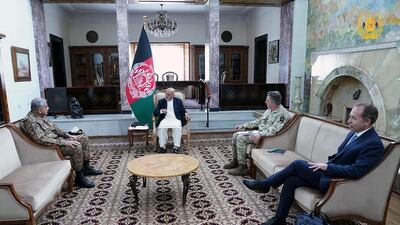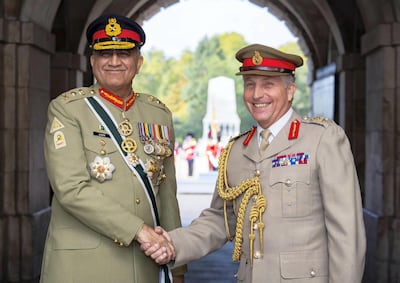Britain's military chief is involved in an initiative in which Pakistan's intelligence is attempting to dissuade the Taliban from launching attacks on international forces as they leave Afghanistan.
The head of the British military, Gen Sir Nick Carter, travelled to Kabul recently for a meeting that brought together the Afghan president and head of Pakistan's military to discuss the Taliban and withdrawal of troops.
Gen Carter’s visit was confirmed by the Ministry of Defence, which on Thursday said he was there as part of the “peace process”.
Britain has 750 troops in the 7,000-strong Nato contingent alongside 2,500 Americans who will all withdraw by September 11 after 20 years fighting the Taliban in Afghanistan.
But security officials disclosed that Pakistan Inter Service Intelligence, often accused of backing the Taliban, told the extremists to let foreign troops leave in peace to ensure their departure.
"The ISI is trying to persuade the Taliban not to launch attacks against international forces from now until September 11," a security source told The National.
“Pakistan is trying to moderate the Taliban so the international forces aren’t forced to stay if the security situation deteriorates. The ISI wants to continue its influence over Afghanistan once the British and Americans have left.”
If the Taliban launches successful attacks on foreign troops over the next five months, it could subsequently claim a significant victory in forcing the US and its allies to withdraw.
Pakistan ISI’s apparent intervention came after Taliban commanders threatened attacks on foreign troops when the new US administration ignored the deadline of May 1 set for withdrawal by former president Donald Trump.
“There was anger in their ranks that the Americans had broken the agreement and the Taliban wanted to launch a new offensive,” the source said.
However, it is also understood that no request was made for the Taliban to curb attacks on local Afghan forces or civilians. In a horrific bombing attack on Saturday, 85 people, mostly schoolgirls, were killed in Kabul, although this was claimed by the Afghan branch of ISIS.
Taliban fighters overwhelmed several Afghan government positions and this week seized a district in Wardak province, about 40 kilometres west of Kabul.
The deteriorating security situation led the Afghans to call on Pakistan for assistance, despite a fractured relationship with the country.
Gen Carter apparently facilitated the meeting between Afghan President Ashraf Ghani, Pakistan’s highly influential military chief Gen Qamar Bajwa and ISI chief Gen Faiz Hameed.
The British government did not disclose that Gen Carter had been in Afghanistan until confirming it with The National on Thursday.
The officer is seen as a key moderator having nurtured longstanding relationships during his time as Nato’s deputy commander in Afghanistan with Mr Ghani. He is on good terms with Gen Bajwa, whom he has hosted in London at the Ministry of Defence HQ, as well as at social events, including an international cricket match at Lord’s.
A senior Afghan official said the British general had played an "important part" in getting the Afghans and Pakistanis together, which was difficult given the recent history between the countries. He said it was important Gen Carter continued his "constructive role".
Mr Ghani’s office said the meeting on Monday involved “Pakistan’s role in the peace process and stopping violence in Afghanistan”.
The British government said Gen Carter was invited by Mr Ghani and had "participated in a bilateral meeting" with Gen Bajwa and the president that "included discussions on the Afghan peace process".
“Sir Nick Carter reaffirmed the UK’s continued commitment to work with both Afghanistan and Pakistan as partners in the fight against terrorism in the region,” the official said.
While the Nato withdrawal is unlikely to be as precipitate as the Russian exit in 1989, there are concerns that with the absence of western troops the Taliban will wait until it is strong enough to seize Kabul. That last happened in 1996, four years after Russia cut financial aid to the Afghan government, which was subsequently unable to pay its security forces.
Months before British troops left Iraq in 2009, senior military and intelligence officials negotiated an accommodation with local Shiite militias to end the fighting before their withdrawal.



